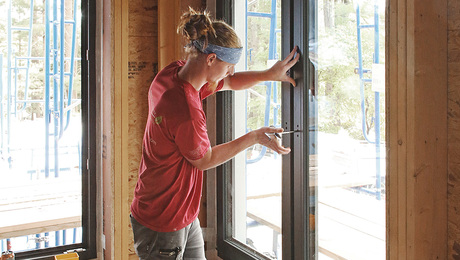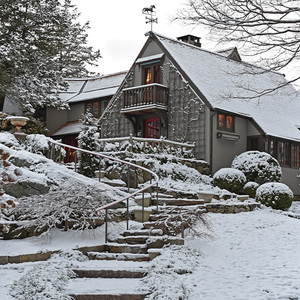I am looking for some straight answers on an oil burner. My shop has a very old steam boiler and it is fired by a Beckett oil burner. I think it is an AFG but I can’t swear to that. It is about 20 years old it and works well enough.
Is it worth replacing it with a new unit? With oil now somewhere in the $4 -$5 range even a 10% efficiency increase will pay off in less than a year. I burn somewhere around 1000 gallons per season and it looks like I can buy a new Beckett for about $300 or so. I will do the replacement myself so there are no other costs to factor in.
My main question is – have oil burners become more efficient over the past 20 years? If so, how much? Is it reasonable to expect a 10% savings with the new technology? From the pictures I’ve seen, the new Beckett looks very much like my old one.
I used to have a service contract with an oil company, but I have a real problem with the guy who benefits from me using more oil (by selling me more of it) adjusting my burner to “maximum efficiency”. Maybe I am a skeptic, but I always felt like they could tweak the system so I would use maybe 2 or 3 percent more oil and I would never know the difference. That is why I am suspect about any info that I get from my oil company and I feel like the manufacturer will give me all sorts of numbers, inflated or not, that will “prove” that it is a good investment to buy the new unit.
I hope someone has some unbiased experience with this.
Thanks.















Replies
You got the right mind set that is for sure. An informed shopper arms himself with all the facts, not just the good ones the sales people talk about. For there will ALWAYS be a downside to any product ... period.
I haven't worked w/ oil boilers in a while ... I imagine they are much like other combustion technologies .... there should be a condensing style high efficiency (e.g. 90-95% combustion) unit available to you. There also may be retrofits available for your existing furnace to improve efficiency (although not condensing style ratings).
Another option might be conversion to gas or propane?
I don't work with them professionally, so I won't offer much insight to efficiency improvements, but I'll say I think they're pretty much unchanged -from limited personal experience.
I can say though, that proper air/oil mix (the adjustment) is very important. Too lean, it'll hard start and overheat the exchanger/hardware; too rich and it'll smoke, coke the firebox, and leave unburnt fuel...poof!
I don't think a tech would try to lean on it for 2-3% more usage...I mean really that works out to maybe $150 a year...and nothing if your house/shop burns down.
The technology of the burner has not changed significantly in the last 40 or 50 years. The technology of the boiler heat exchanger varies significantly from the old cast iron style to the newer low mass cast aluminum versions, and from manufacturer to manufacturer. The controls that modulate burners, be they gas or oil, have changed significantly on the higher end modulating units. The Beckett you reference is a very simple, non-modulating unit, with simple controls. Unless it has structural failure of the mounting plate or significant corrosion of any of the air controls, not worth changing.
The last boiler that I was personally invoved with was using a Gordon-Piatt burner that had remained unchanged throughout the 80's 90's and early 00's. Probably still unchanged.
Optionally, you should be able to locate an independent local boiler mechanic to clean, inspect and adjust you burner (and draft).
A service call for a reasonable sum can give you peace of mind and a local independent expert's opinion.
The "problem" is you have a steam boiler. Never going to get much more than about 80% out of the system.
Combustion is only one part of the equation. Scale in the boiler is a HUGE energy hog. Make sure the traps or air vents are all working. Insulate pipes if not already done. Make sure the steam pressure is less than 2psi. The lower the better. What shape are the heat emitters in?
You have to look at the whole system, not just the burner.
When I had an independant boiler tech check my boiler, he found the pressure was high on the pump. That will certainly use more oil. Is yours a wood shop? I'd think about a wood gasification boiler, big dollars though. Tarm is one manufacturer.
Both of the steam boilers in my house are at 85% efficiency. That's the best I can get out of them w/out spending a few thousand for a more efficient model. Once a year I have both boilers drained and flushed out to remove sediment and scale, then some 'boiler treatment' is added. Air vents are crucial, spend a few more $ and get some quality ones like "Heat Timer Varivalves" or some other decent brand. Avoid the vents sold at the orange or blue box stores, they're ####. Lat of all, take poke over at http://www.heatinghelp.com, a great source of reference.On a side note, the original steam/forced air furnace in my house, installed in 1886, is still in working condition, just not tied into the main system. Removing it would be a bear as it's 12' wide, 6' tall, 20' long. Name on the access doors is "The Cottage Electric Furnace, 1885", and reminds me of the movie '20,000 leagues under the sea' with the original brass gauges and control levers.Later...
Thanks to all for the input.
I spoke to Beckett about the issue and they were pretty honest about the technology not really changing much in the past few decades. The tech saw no real reason to upgrade unless the old one was malfunctioning.
I think I will hire an independent boiler tech to give the system the "once over". I looked into the combustion analyzer tools (any excuse to buy new tools, right?) but they cost over $1000.00 and I don't think they will pay for themselves in my lifetime.
On another note, the tech @ Beckett said to look into a "heat manager" by Intellidyne. It is only for hydronic systems and it looks interesting. It is supposed to save at least 10% on heating costs. It works by limiting the amount of times the boiler cycles. It somehow "knows" if the heat load requires the water in the system to be heated or if circulating the returned water will provide enough heat to satisfy the thermostat.
I found it on ebay and a company near me, Patriot Systems, sells them for $189.00. Installation looks simple and if I can save 10% it looks like a no brainer.
Anybody hear of these before? Any feed back? It almost seems too good to be true.
Thanks for the help.